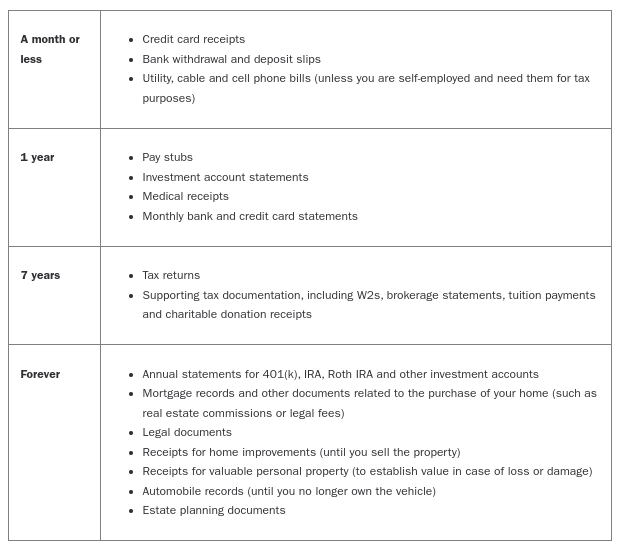Organizing your financial life begins with getting your records in order. But managing the constant flow of new documents, while also retaining the old, can feel overwhelming. Left unattended, pay stubs, financial statements and tax forms can quickly pile up.
Thankfully, there are practices to help you manage these sensitive files efficiently and securely.
Working with us gives you access to digital tools and safe document storage to help simplify record keeping. Here are steps to help organize your financial records, so you can feel more confident about your financial life:
1. Gather your records
The first step to getting organized is gathering all your financial documents in one place to account for the breadth of records you’ve generated in the past and how often you receive them. Locate paperwork stored in physical or digital files, email or paper inboxes or other areas.
Here are a few documents to look for:
- Tax statements / returns
- Retirement plan and investment statements
- Mortgage and personal property records
- Insurance policies
- Bills
- Receipts
- Financial account statements
- Checks
- Pay stubs
- Employee benefits
- Estate planning documents
2. Audit and dispose of outdated paper documents
While there will be numerous records you’ll need to retain, there are also likely many you’ll be able to discard. Remember to shred any documents containing account numbers, birth dates, Social Security numbers, or other potentially identifying information before you dispose of them. As you review your paper documents, consider if you can access these documents online or if electronic delivery is an option.
General retention guidelines for financial records

3. Decide where (and how) to store your records
It’s easy to misplace documents if they don’t have a designated home, which is especially important for records that you may need on short notice or in an emergency. Consider the best location for your files:
- Physical records: While a folder or binder might be enough if you have just a few physical documents, you are more likely to need a file box, drawer or cabinet dedicated to your financial records. Consider a fire-resistant file cabinet or safe to store original, hard-to-replace physical records such as a will or power-of-attorney documents.
- Electronic records: Storing records electronically can save space and provide added security. Many banks and financial institutions offer clients access to records on their sites, which can be convenient and seamless for you. However, if you prefer to have your own copies, bank and credit card statements can be downloaded and saved digitally, while physical papers can be scanned and converted into electronic files. If you store your electronic records locally, remember to create backup files on a portable storage device or on an encrypted cloud storage service.
Remember: Ameriprise offers digital tools giving you the ability to store, share and review your financial documents in once place, safely and securely.

4. Create a filing system that works for you
There are many ways to organize files, but the most important factor is creating a system that makes sense to you — and to be consistent with file naming and location. For example, you could organize your system by type of financial document (i.e., estate and legal documents, bills, receipts, tax statements, payment stubs) or by broader life topics and events (i.e., car, house, work, wedding, insurance, etc.).
Whatever system you choose, consider organizing documents within each folder chronologically for easier access when you need them.
5. Make a list of accounts and passwords
In case you ever get locked out of your accounts or if a loved one needs access, create a list of all financial records and accounts, as well as instructions to access them, including usernames, passwords and PINs. Keep the list secure and updated, and share it only with those you trust, such as a spouse, partner or adult child.
6. Review and purge your records annually
At least once a year, review and discard old and unneeded documents — both physical and digital. For physical records, shred — don’t just recycle — documents, especially those that include any personal information such as account numbers, birth dates or Social Security numbers.
Manage your records effectively and safely
Organizing your financial records can give you clarity about your current financial situation, making it easier to reach your financial goals. If you have questions about the digital tools Ameriprise offers you to store important documents, reach out to us.

Questions? Contact Michael Matus, your local Ameriprise Financial Advisor, today!

Sign up for our Sunday Spectator. Delivered to your inbox every Sunday, with all the news from the week.









